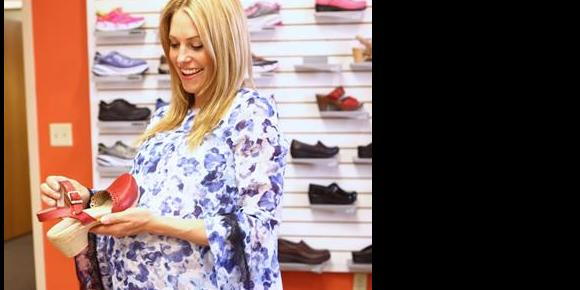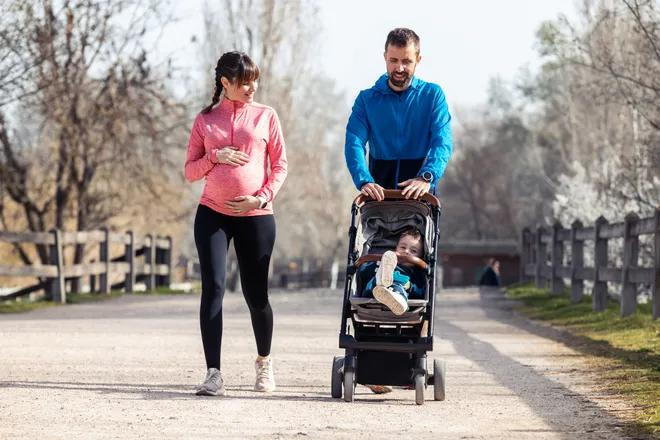
Important tips for pregnant moms on how to take care of foot concerns
From edema to overpronation, feet can take on the brunt of a pregnancy and need attention.
By: John Sigle, DPM, FACFAS
for the Foot & Ankle Center of Illinois
In honor of Mother’s Day, it’s fitting to address foot care during pregnancy. Pregnant moms have a lot to think about and do as they prepare for the arrival of their new baby. Some moms are busy decorating the nursery. Others are making frequent visits to their OB-GYN. Some are sending thank you cards for baby shower gifts, changing diets and thinking about names. “Wonder Woman” actor Gal Gadot had to explain how she got pregnant to her younger daughters and give them a PG-rated version of the “birds and the bees.” There are all sorts of things that a pregnant mom has to think about and prepare for, but far too little attention is given to her feet.
As weight naturally increases, the body’s center of gravity changes, adding excessive pressures to the knees, ankles and feet. Edema (swelling) and overpronation (flat feet) are two of the most common foot problems that are overlooked. In order to make the pregnancy period more comfortable, it is important to learn about foot care, and what can be done to relieve aches and pains. Here are some important foot care tips for pregnant moms.
Understanding and managing edema
Many pregnant patients say that their feet are noticeably swelling and ache with pain. Some even say that their feet feel as though they are stretching like a balloon and ready to pop. A certain amount of swelling is normal during pregnancy because more water is retained, and there is a change in blood chemistry causing fluid to shift into the tissue. As the uterus expands, pressure increases in the pelvic veins and the large vein (vena cava) on the right side of the body that carries blood from the lower limbs to the heart. As the return of blood from the legs is decelerated, fluid is pushed from the veins into the tissues in the feet and ankles.
Some women also experience swollen feet and a larger shoe size due to the release of a hormone called relaxin. Although the feet appear to be growing, it is really an illusion because the hormone causes the ligaments to become lax and stretched out.
Roughly 75% of pregnant women experience edema, especially by the time they reach their third trimester. Edema is considered to be worse during the summer and at the end of the day. Edema is more strenuous for women who are carrying multiples, or for those who have excessive amniotic fluid.
Edema is annoying, to say the least, but it is normal and generally harmless. It is important to pay close attention if there is excessive or sudden swelling to the feet, hands and face, or puffiness around the eyes. Call your doctor promptly if these symptoms are present because it could be a sign of preeclampsia, a pregnancy-induced hypertension that occurs 5%-10% of the time. Also, contact your doctor immediately if one leg is significantly more swollen than the other or if there is pain in the calf area. These conditions could be a sign of a blood clot.
The good news is that most women’s feet will be fine following childbirth and should return to their normal size. Here are some tips to minimize edema:
- Keep the body hydrated and drink plenty of water to flush your system of excess sodium and other waste products. Also, eat a well-balanced diet with low salt content.
- Avoid long periods of sitting or standing and take breaks if you are on your feet a lot.
- Take several short walks if you are sitting for any length of time. Elevate your feet when sitting.
- Wear seamless stockings that do not restrict circulation, and choose sock fabrics, such as cotton instead of nylon, that allow your feet to breathe.
- Use proper foot care hygiene by trimming toenails, removing calluses and using moisturizer to avoid dry and cracked skin.
- Give yourself a foot massage or ask your partner, family member or friend to help.
Minimize overpronation

Overpronation is another common problem that occurs during pregnancy as a result of added weight gain. It occurs when a person’s arch flattens out during weight-bearing movement (like walking), causing the feet to turn in abnormally. The dense band of tissue that extends from the heel to the forefoot (plantar fascia) becomes strained and inflamed due to increased flattening of the feet. Walking can become very painful, and women may experience increased discomfort and strain on the feet, calves and back. Regular exercise and proper footwear are the most helpful ways to minimize overpronation. Helpful exercises include:
- Straight-knee calf stretch — Place the palms of your hands on a wall. Move one foot forward about 12 inches. Keeping toes pointed forward and both heels on the floor, lean toward the wall.
- Bent-knee calf stretch — Place the palms of your hands on a wall. Move one foot forward about 12 inches. Keeping toes pointed forward and both heels on the floor, bend both knees and lean forward.
- Ankle circles — Sit straight-legged on the floor or another firm surface. Rest your calf muscles on a rolled-up bath towel or blanket. Rotate your ankles in each direction for two minutes.
- Reverse calf raise —After removing your shoes and socks, sit with your heel at the edge of a book or block of wood that is at least three inches high. Raise the front of your foot as far as you can, then lower it back down.
- Standing calf raise — Using a sturdy counter for balance, stand and lift one foot so you are supported by the other foot. Rise up on the ball and toes of the standing foot.
- Exercise regularly — Walking, swimming or riding an exercise bike is recommended. Water aerobics classes are also excellent.
Select proper footwear
- Select proper footwear and avoid going barefoot or wearing sandals or flip flops because they do not provide support for your arch. Other things to consider when it comes to footwear:
- Wear low-heeled shoes that are soft, comfortable and provide room to move.
- Use ready-made orthotics or custom orthotics that provide arch support and shock absorption.
- Wear seamless socks that do not constrict circulation.
- Use laser therapy on your feet and ankles if you are experiencing plantar fasciitis, tendonitis, achiness and pain.
Your feet need to be in good shape to carry you and your baby. Understanding the causes of foot pain and learning easy home remedies can help.
Contact the Foot & Ankle Center of Illinois at 217-787-2700 to schedule an appointment. The Foot & Ankle Center of Illinois is conveniently located in Springfield, Decatur, Taylorville, Carlinville, Shelbyville, Sullivan and Monticello.
View a short video on cutting-edge MLS laser therapy for reducing edema and pain management, learn about the benefits of custom orthotics, and visit myfootandanklecenter.com for more information.
